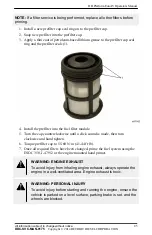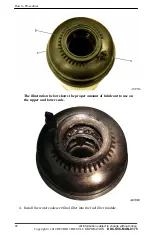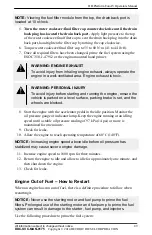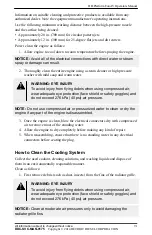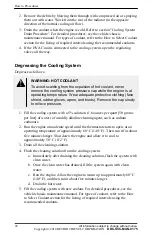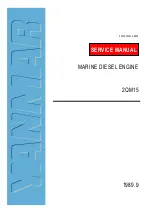
Coolants Not Recommended
The following coolants are not recommended for use in Detroit™ engines.
•
Antifreezes and Coolants Containing Phosphate
– Coolants containing
phosphate are not recommended. Drop out, overheating, and water pump seal
failures can result from the use of coolant or inhibitor packages based on
phosphate.
•
Automotive Type Coolants
– These coolants generally contain high levels of
phosphate and silicate, offer no liner pitting protection, and are not suitable for
use in Detroit™ engines.
•
Methyl Alcohol-Based Antifreeze
– Methyl Alcohol-Based Antifreeze must not
be used because of its effect on the non-metallic components of the cooling
system and its low boiling point.
•
Glycol-Based Coolants Formulated for HVAC
– These coolants formulated
for Heating/Ventilation/Air Conditioning (HVAC) should not be used. These
coolants generally contain high levels of phosphates, which can deposit on hot
internal engine surfaces and reduce heat transfer.
Additives Not Recommended
The following additives are not recommended for use in Detroit™ engines.
•
Soluble Oil Additives
– These additives are not approved for use in Detroit™
engine cooling systems. A small amount of oil adversely affects heat transfer.
For example, a 1.25% concentration of soluble oil increases fire deck
temperature 6%. A 2.50% concentration increases fire deck temperature 15%.
The use of soluble oil additives may result in engine overheating and/or failure.
•
Chromate Additives
– These additives are not approved for use in Detroit™
engine cooling systems. Chromate additives can form chromium hydroxide,
commonly called "green slime." This, in turn, can result in engine damage due to
poor heat transfer. Cooling systems operated with chromium-inhibited coolant
must be chemically cleaned with a recommended cooling system cleaner/
conditioner (or equivalent sulphuric acid/sodium carbonate cleaner) and flushed.
Testing for Supplemental Coolant Additives
Detroit Genuine Fluid Analysis 3–Way Coolant Test Strips should be used to
measure nitrite and glycol concentrations. Cavitation/corrosion is indicated on the
strip by the level of nitrite concentration. Freeze/boil over protection is determined
by glycol concentration.
WARNING: HOT COOLANT
To avoid scalding from the expulsion of hot coolant, never
remove the cooling system pressure cap while the engine is at
operating temperature. Wear adequate protective clothing (face
shield, rubber gloves, apron, and boots). Remove the cap slowly
to relieve pressure.
DD Platform EuroIV Operators Manual
All information subject to change without notice.
97
DDC-SVC-MAN-0175
Copyright © 2014 DETROIT DIESEL CORPORATION



